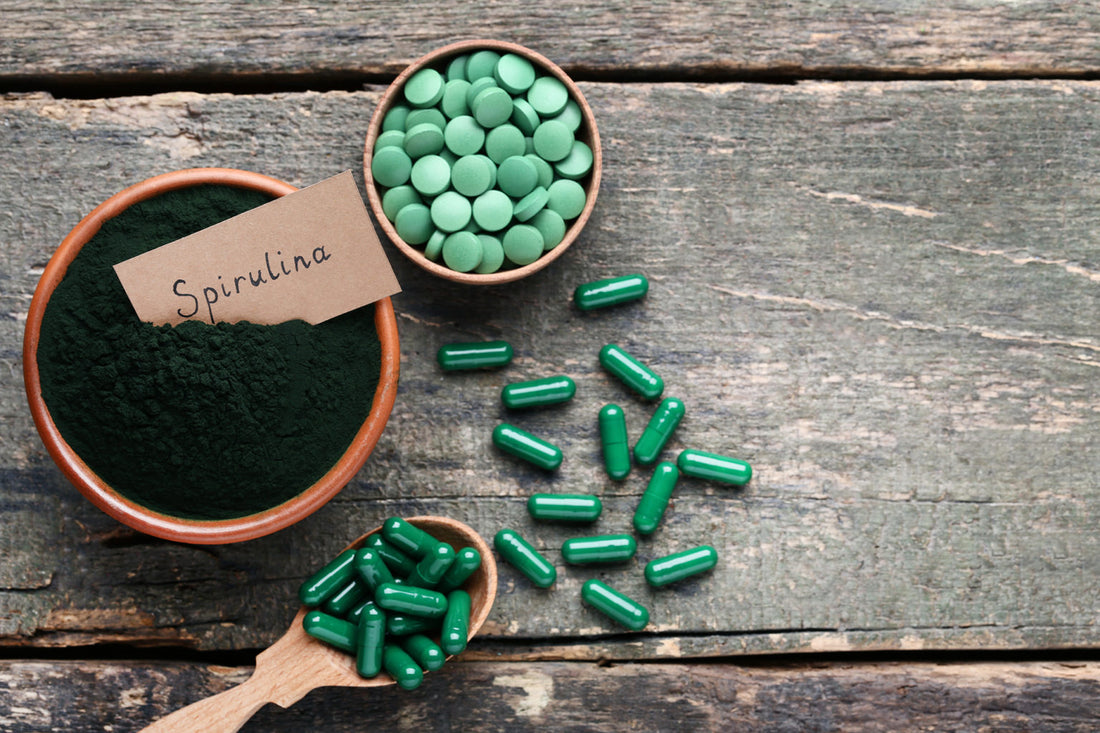
Spirulina: A Superfood with Incredible Health Benefits
Spirulina is a superfood that has gained popularity due to its high nutritional density and multiple health benefits. Below are some of its most notable properties:
Nutritional Composition and Benefits
-
High Protein Concentration: Approximately 60% of spirulina's dry weight is protein, making it an excellent protein source. This protein is of high biological value and contains essential amino acids, making it an ideal option for vegetarians and vegans.
-
Rich in Vitamins and Minerals:
- Vitamin B12: Spirulina is one of the few plant-based sources of vitamin B12, which is essential for the nervous system.
- Beta-Carotene: Spirulina is the richest food in beta-carotene, with antioxidant properties that help protect against cancer and cellular aging.
- Minerals: It is rich in iron, calcium, magnesium, phosphorus, zinc, and other trace elements, which help prevent nutritional deficiencies, especially in vulnerable populations.
-
Essential Fatty Acids: It contains gamma-linolenic acid (GLA), an omega-6 fatty acid found in breast milk, vital for baby development, and helps regulate inflammation in the body.
-
Antioxidant Properties: Beta-carotene and phycocyanin (a pigment in spirulina) are powerful antioxidants that protect the body from cell damage caused by free radicals. Additionally, spirulina is known for supporting the immune system and reducing inflammation.
Spirulina Against Diseases
-
Cancer Prevention: Spirulina has anticancer effects due to its antioxidant components. Although there are promising studies in animals, research in humans is still limited. However, some studies have shown regression of precancerous lesions in humans after consuming spirulina.
-
Cardiovascular Health: Its ability to reduce LDL cholesterol (bad cholesterol) and improve the LDL/HDL ratio makes it useful for preventing cardiovascular diseases. It has also been shown to help lower blood pressure.
-
Detoxification: Spirulina is effective in removing toxins from the body, including heavy metals like mercury and arsenic, making it a good detox supplement. In one study, children exposed to radiation in Chernobyl showed a significant reduction in radionuclides after consuming spirulina.
-
Anti-inflammatory Properties: Spirulina inhibits the production of pro-inflammatory cytokines and has proven useful in treating conditions like allergic rhinitis and inflammatory diseases.
Uses for Digestive and General Health
- Healthy Digestion: Spirulina stimulates the growth of beneficial bacteria like Lactobacillus and Bifidobacterium, improving gut function and digestion.
- Immune System Strengthening: Spirulina is known to increase the activity of immune cells, helping to prevent infections and diseases.
Spirulina for Skin Health
Spirulina's high content of antioxidants and essential fatty acids can help maintain skin elasticity and protect it from sun damage, thus preventing premature aging.
Applications in Medicine and Agriculture
Spirulina is used in a variety of fields, from agriculture (as a natural fertilizer and animal supplement) to medicine (in the treatment of conditions like liver cirrhosis and allergies).
Safety and Consumption
Despite all its benefits, spirulina should be consumed properly and with caution, especially if obtained from unverified sources, as it may be contaminated with toxins. Generally, it is considered safe for human consumption and has shown few side effects.
In summary, spirulina is an exceptionally complete and versatile functional food, offering benefits for immune, digestive, cardiovascular health, and much more. This makes it an excellent supplement for combating malnutrition and improving overall health.

